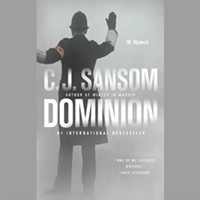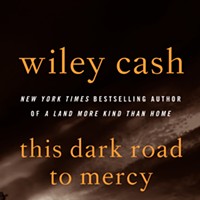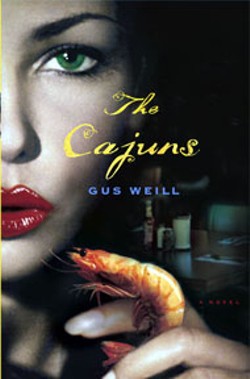The novel resulted from a conversation with Weill's most famous protege, the political strategist James Carville, best known for leading Bill Clinton's 1992 presidential campaign.
In a recent telephone interview from New York, where he has lived since December 2002, Weill remembered the conversation that led to his new novel.
"He said to me, "Gus, you ought to write a book about the Cajun people because you know them so well,'" Weill said. "And he's such a brilliant man, when he gives me an idea, it's pretty hard to walk away. But it was a terrible challenge, you know?"
Eventually, the plot came together. Weill hung his story on an aging, corrupt state senator named Papoot Gaspard gasping for political life after 36 years in office. His tormentor? The owner of the Esso station, President Prejean.
Papoot's son-in-law, Bobby Boudreaux, is the sheriff of fictional Richelieu Parish, as well as the novel's conscience. The local priest, Father Justin, is Papoot's son.
Throw in a smoldering newspaper reporter, Ruth Ann Daigle, and the mysterious death of a child named Ti Boy Brouliette, and matters become much more interesting -- and vexing -- for the sheriff and the parish powerbrokers.
Weill has written two more novels since he finished The Cajuns. Now that he's in his 70s, "this old bad thing called mortality enters the picture. I'm writing as fast as I can."
For Weill, a former executive secretary to Louisiana Gov. John McKeithen, the combination of 1950s Acadiana and a rich election milieu allowed for ample mining of his lengthy career as a political consultant. Beyond McKeithen's successful gubernatorial runs, Weill has worked with more than 350 political campaigns during his lengthy career. Writing this novel, he said, allowed him to fictionalize some of his favorite political episodes.
"Gus was always telling stories, from the first day I met him," Carville said in a recent telephone interview from his Washington office. "There aren't many people who can tell you the same story, like, 11 times and still make you want to hear it again. He's the best raconteur I've ever met."
Petty theft, sexual misadventure and corruption ooze through Richelieu Parish. When Papoot visits the local bordello, he's not a paying customer, he's a paid customer. Hurphy Perrault, the powerful attorney, makes justice a profitable endeavor far beyond client fees. Small-town life, in all its claustrophobic familiarity and stark pecking orders, rings true in Weill's depiction. The banker calls in notes early to put pressure on the newspaper to drop a divisive story. Much of the town business is decided not at city hall, but at the barbershop.
And, being a story of Cajuns, food is forever taking center stage: cakes, gumbos, jambalayas and all the rest.
With Weill, the writing and the story are like spicy boudin: You don't always like what's in it, you're not sure how it came together, but, damn, it sure is tasty. Best of all, he nails Cajun humor and tall tales.
On one occasion, Papoot visits the local sex shop seeking a more lucrative kickback from Misty, the proprietor. As they discuss terms, the senator spots Hurphy Perrault, the town's well-to-do attorney, being chatted up by one of the call girls.
"She's wasting her time on Hurphy, that's one slick lawyer," Papoot tells Misty. Her response? "Everybody's slick, until they get a hard-on."
When Walter Isaacson covered Louisiana politics for the New Orleans States-Item, Weill was among a group of colorful consultants -- Ray Strother, Shelly Beychock and Carville, among them -- who delighted in the flamboyant lore of the state's political scene. It's only fitting, Isaacson said in a recent interview, that Weill is now telling stories in novels rather than political backrooms. Isaacson, the best-selling biographer of Benjamin Franklin and a former executive at Time and CNN, uses the same word Carville does when describing Weill: raconteur. "Gus's love of people comes through in his novel," he said. "It has spice and a lot of colorful characters."
Those characters are familiar to anyone who's spent time in South Louisiana. Characters armed with outsized personalities and wayward moral compasses. There's the shady insurance broker, Tooky Trahan; the ubiquitous, rascally centenarian, Nonc Doucet; Big Shot (and Li'l Shot) Fontenot, the men behind every financial transaction, big or small; the local dance hall band, Papa Sotile and the Richelieu Gents and, of course, the blather-filled local deejay, Na Na Duhon. Asides on Huey Long's assassination -- and the attendant assassin's bullets lodged in the state capitol -- and political haunts offer a glimpse into the undying passion among Louisianians for campaigns, elections and legislative horse-trading.
Consider, for example, Weill's description of Papoot's waning popularity:
Many vowed to vote his ass right out of Baton Rouge the very next opportunity. Give another fool a chance, and any man named President Prejean had to be a fool for sure. So far as they knew, President was not yet a crook, but they acknowledged at his filling station, there wasn't much opportunity. Also, they were prepared to accept a little stealing his first term or so. But they didn't want him rubbing their faces in it.
Are we talking Sixty Rayburn or Edwin Edwards here? Weill's not saying, he's just enjoying the rascals he's created -- and witnessed. "You'll recognize some of these characters," he said. And then, keeping in character, he slipped into a series of vignettes and anecdotes, each introduced with a seductive query: "Can I tell you a story? Do you have time to hear this?"
As the ultimate insider (he grew up in Lafayette) and outsider (he was part of the city's tiny Jewish population), Weill gleaned the essence of Cajun life. He has the region's patois, its rhythm and its unique flavor, but keeps his cayenne creations from lapsing into caricature, no small feat in Louisiana literature.
Mossy oaks and rosary-draped Catholics are fine, but not without a compelling narrative. The Cajuns delivers on all counts.
Latest in Feature
More by Erik Spanberg
-

Book review: Natchez Burning
Jul 2, 2014 -

Book review: Dominion
May 16, 2014 -

Book review: Wiley Cash's This Dark Road to Mercy
Mar 21, 2014 - More »
Calendar
-

NEW WINDOW GALLERY-Pat Rhea-ACRYLIC PAINTINGS-April 05-30 2024 VALDESE, NC 28690 @ New Window Gallery/Play It Again Records
- Through April 30, 12 p.m.
-
Derek Hough - Symphony Of Dance @ Ovens Auditorium
-

"Blood Residue Analysis of Paleoamerican Stone Tools in the Carolinas" @ Native American Studies Center
- Fri., April 26, 12-1 p.m.
-

ARTS RENAISSANCE, a GALA supporting the ARTS in South Carolina @ the Columbia Museum of ART
-
 The Piano Guys @ Ovens Auditorium
The Piano Guys @ Ovens Auditorium
-
The death of CAST 5
What really happened to Charlotte's beloved experimental theater company?
-
Jessica Moss Makes the Gantt Center a Safe Zone for Local Artists 2
Flipping the script
-
Charlotte ink 7
Behind the pain with a trio of the Queen City's finest tattoo artists











